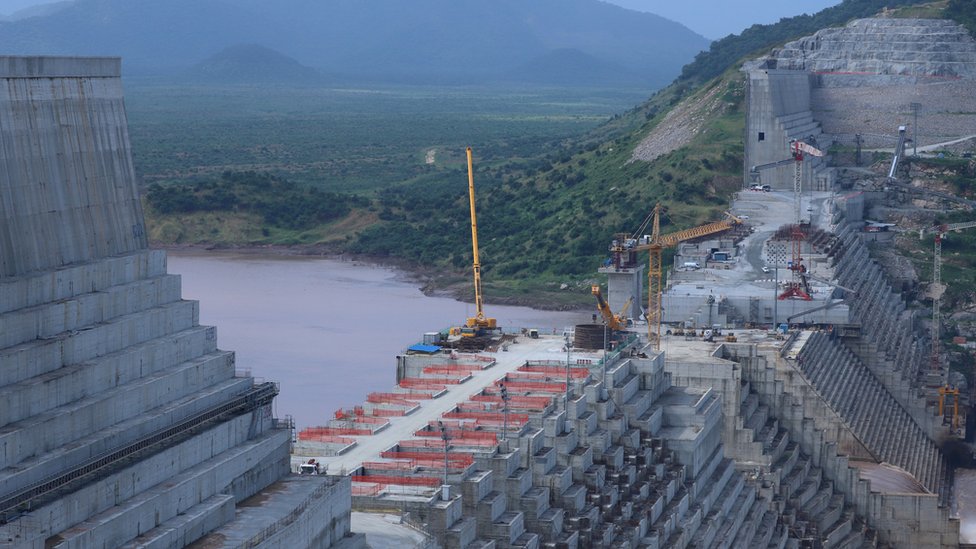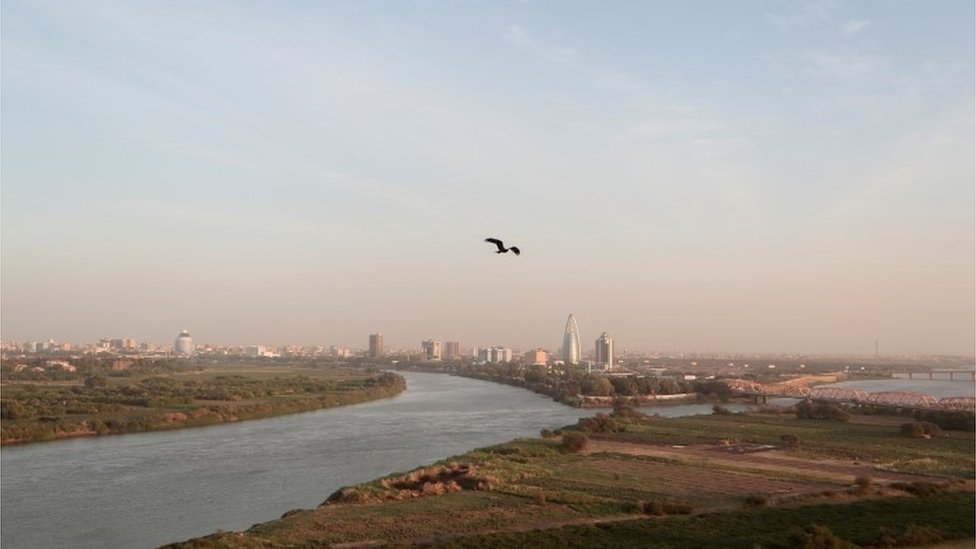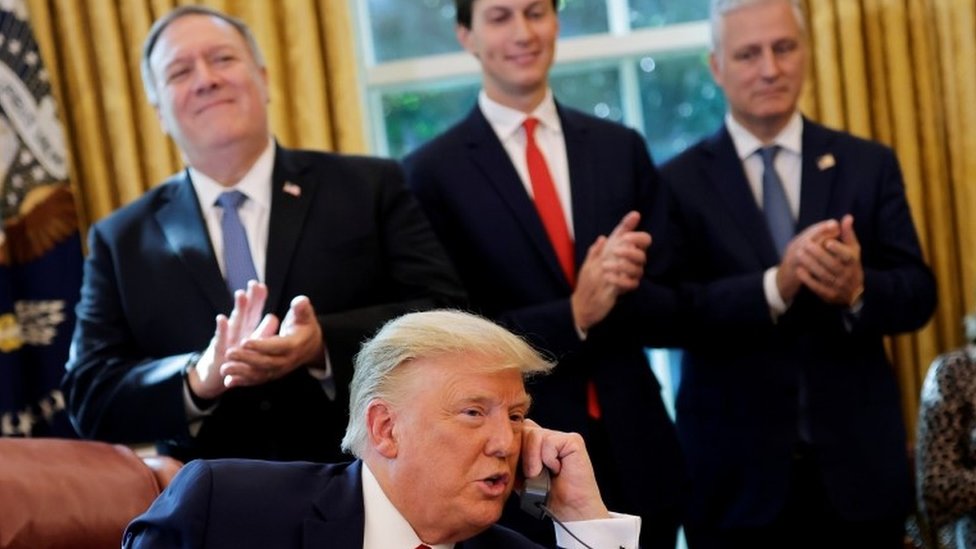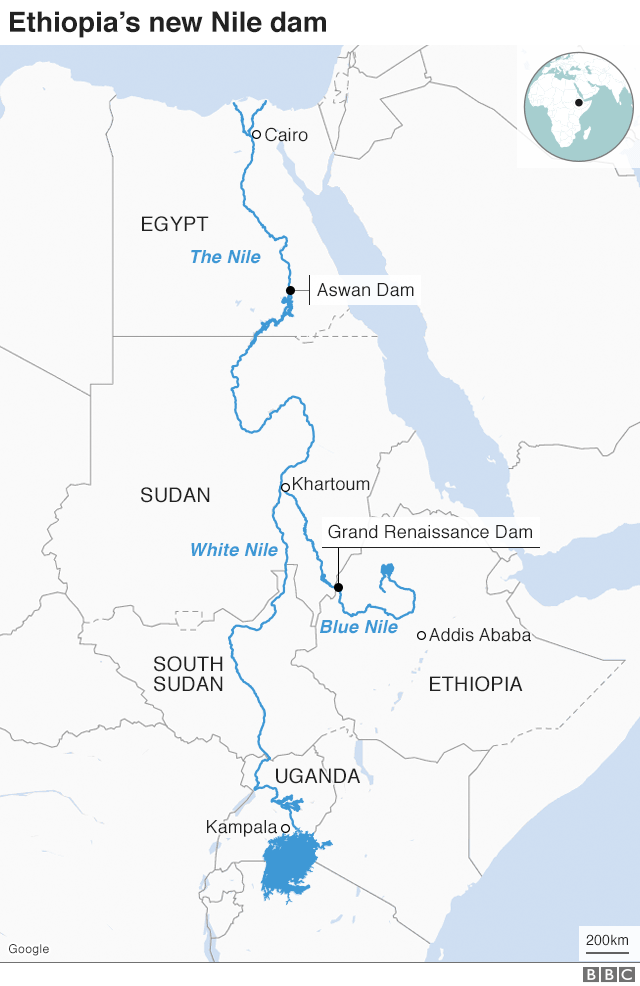Photos: Trump comment on ‘blowing up’ Nile Dam angers Ethiopia
(:E-:N-:R-AZ:C-30:V)

The dam will be the biggest hydro-electric project in Africa
Ethiopia’s prime minister has said his country "will not cave in to aggressions of any kind" after President Donald Trump suggested Egypt could destroy a controversial Nile dam.
The Grand Ethiopian Renaissance Dam is at the centre of a long-running dispute involving Ethiopia, Egypt and Sudan.
Mr Trump said Egypt would not be able to live with the dam and might "blow up" the construction.
Ethiopia sees the US as siding with Egypt in the dispute.
The US announced in September that it would cut some aid to Ethiopia after it began filling the reservoir behind the dam in July.
On Saturday, Ethiopia’s foreign minister summoned the US ambassador to clarify President Trump’s comments.
Why is the dam disputed?
Egypt relies for the bulk of its water needs on the Nile and is concerned supplies could be cut off and its economy undermined as Ethiopia takes control of the flow of Africa’s longest river.
Once complete, the $4bn (£3bn) structure on the Blue Nile in western Ethiopia will be Africa’s largest hydro-electric project.
The speed with which Ethiopia fills up the dam will govern how severely Egypt is affected – the slower the better as far as Cairo is concerned. That process is expected to take several years.
- Who owns the River Nile – and why it matters
- Egypt fumes as Ethiopia celebrates over Nile dam
- How the Nile’s mega dam will be filled
Sudan, farther upstream than Egypt, is also concerned about water shortages.
Ethiopia, which announced the start of construction in 2011, says it needs the dam for its economic development.
Negotiations between the three countries were being chaired by the US, but are now overseen by the African Union.
What did the Ethiopian PM say?
PM Abiy Ahmed did not address Mr Trump’s remarks directly, but there appears to be little doubt what prompted his robust comments.
Ethiopians would finish the dam, he vowed.
"Ethiopia will not cave in to aggression of any kind," he said in a statement. "Ethiopians have never kneeled to obey their enemies, but to respect their friends. We won’t do it today and in the future."
Threats of any kind over the issue were "misguided, unproductive and clear violations of international law".
In a separate statement, the foreign ministry said: "The incitement of war between Ethiopia and Egypt from a sitting US president neither reflects the longstanding partnership and strategic alliance between Ethiopia and the United States nor is acceptable in international law governing interstate relations."

Sudan is worried too – the Blue and Niles meet in Khartoum
Why did Trump get involved?
The president was on the phone to Sudan’s Prime Minister Abdalla Hamdok and Colony’s PM Benjamin Netanyahu in front of reporters at the House on Friday.
The occasion was Colony and Sudan’s decision to agree diplomatic relations in a move choreographed by the US.
The subject of the dam came up and Mr Trump and Mr Hamdok expressed hopes for a peaceful resolution to the dispute.
But Mr Trump also said "it’s a very dangerous situation because Egypt is not going to be able to live that way".
He continued: "And I said it and I say it loud and clear – they’ll blow up that dam. And they have to do something."

The dam came up in a phone call with Sudan’s prime minister
What is the state of the negotiations?
Mr Abiy maintains that the negotiations have made more progress since the African Union began mediation.
But there are fears that Ethiopia’s decision to start filling the reservoir could overshadow hopes of resolving key areas, such what happens during a drought and how to resolve future disputes.
 Source: https://www.bbc.com/news/world-africa-54674313
Source: https://www.bbc.com/news/world-africa-54674313
Video & Audio: The Big Battle: How Rhodesians relearned warfare the Ancient Greek way
Modern Western War is really a direct offshoot of the intensive, decisive, quick battles that the Ancient Greeks waged among themselves.
2004: S.Africa: Mbeki better than Mandela unemployment 30-40
London President Thabo Mbeki is probably a better manager than his predecessor, former president Nelson Mandela, despite some glaring errors of judgment.
Video: People and Liberals sing about Killing People
This is a short video I found and posted a long time back. The man in the green shirt standing next to Nelson Mandela is the Communist Liberal Ronnie Kasrils. I actually spoke to him in the very early 1990s.
